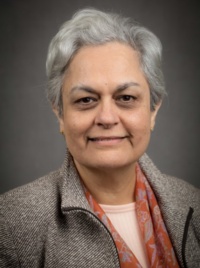Anjuli Bamzai
Anjuli S. Bamzai currently serves as Senior Science Advisor, Global Climate Change in the Directorate for Geosciences, National Science Foundation (NSF). In this role she represents NSF at various leadership positions in interagency Working Groups e.g., U. S. Global Change Research Program, Interagency Arctic Policy Research Committee, Climate Security Advisory Council, U.S. Climate Variability and Predictability program, as well as ad hoc Working Groups convened by the Office of Science and Technology Policy e.g. Fast-track Action Committee on Earth System Predictability.
At NSF, she has served as Division Director, Atmospheric and Geospace Sciences, Section Head Atmosphere Section, program director Arctic Natural Sciences and program director Climate and Large-Scale Dynamics. She has worked as a program manager at National Oceanic and Atmospheric Administration (NOAA) Office of Atmospheric and Oceanic Research, Department of Energy (DOE) Office of Science and NSF. She has highlighted the role of science diplomacy through an Embassy Science Fellowship at the U.S. Embassy in Seoul Republic of Korea, and will be doing a stint as Embassy Science Fellow at the Embassy in Cairo Egypt this summer.
She has served as the US Government reviewer for the IPCC AR4 and was the NSF ex-officio member on the National Climate Assessment and Development Advisory Committee for the third National Climate Assessment. She was program manager for the International Research Institute, Columbia University during its formative period.
Bamzai earned a Ph.D. in Earth Systems and Global Changes from George Mason University (1997). The training she received in India includes the following: Ph.D. in Theoretical Chemistry from the Indian Institute of Technology Bombay India (1979); Masters in Physics from the Indian Institute of Technology Bombay India (1973); and Bachelor of Science degrees in Physics (major), Mathematics and Statistics from Fergusson College, Pune India (1971).
